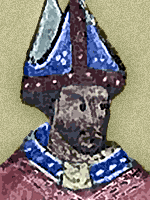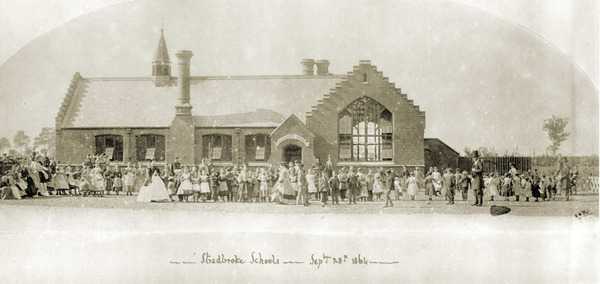|
Robert Grosseteste
Robert Grosseteste, ', ', or ') or the gallicised Robert Grosstête ( ; la, Robertus Grossetesta or '). Also known as Robert of Lincoln ( la, Robertus Lincolniensis, ', &c.) or Rupert of Lincoln ( la, Rubertus Lincolniensis, &c.). ( ; la, Robertus Grosseteste; 8 or 9 October 1253), also known as Robert Greathead or Robert of Lincoln, was an English statesman, scholastic philosopher, theologian, scientist and Bishop of Lincoln. He was born of humble parents in Suffolk (according to the early 14th-century chronicler Nicholas Trevet), but the associations with the village of Stradbroke is a post-medieval tradition. Upon his death, he was revered as a saint in England, but attempts to procure a formal canonisation failed. A. C. Crombie called him "the real founder of the tradition of scientific thought in medieval Oxford, and in some ways, of the modern English intellectual tradition". Scholarly career There is very little direct evidence about Grosseteste's education. H ... [...More Info...] [...Related Items...] OR: [Wikipedia] [Google] [Baidu] |
Bishop Of Lincoln
The Bishop of Lincoln is the ordinary (diocesan bishop) of the Church of England Diocese of Lincoln in the Province of Canterbury. The present diocese covers the county of Lincolnshire and the unitary authority areas of North Lincolnshire and North East Lincolnshire. The bishop's seat (''cathedra'') is located in the Cathedral Church of the Blessed Virgin Mary in the city of Lincoln. The cathedral was originally a minster church founded around 653 and refounded as a cathedral in 1072. Until the 1530s the bishops were in full communion with the Roman Catholic Church. The historic medieval Bishop's Palace lies immediately to the south of the cathedral in Palace Yard; managed by English Heritage, it is open to visitors. A later residence (first used by Bishop Edward King in 1885) on the same site was converted from office accommodation to reopen in 2009 as a 16-bedroom conference centre and wedding venue. It is now known as Edward King House and provides offices for the bisho ... [...More Info...] [...Related Items...] OR: [Wikipedia] [Google] [Baidu] |
Scientific Demonstration
A scientific demonstration is a procedure carried out for the purposes of demonstrating scientific principles, rather than for hypothesis testing or knowledge gathering (although they may originally have been carried out for these purposes). Most scientific demonstrations are simple laboratory demonstrations intended to demonstrate physical principles, often in a surprising or entertaining way. They are carried out in schools and universities, and sometimes in public demonstrations in popular science lectures and TV programs aimed at the general public. Many scientific demonstrations are chosen for their combination of educational merit and entertainment value, which is often provided by dramatic phenomena such as explosions. Public scientific demonstrations were a common occurrence in the Age of Enlightenment, and have long been a feature of the British Royal Institution Christmas Lectures, which date back to 1825. In the television era, scientific demonstrations have featured i ... [...More Info...] [...Related Items...] OR: [Wikipedia] [Google] [Baidu] |
Gerald Of Wales
Gerald of Wales ( la, Giraldus Cambrensis; cy, Gerallt Gymro; french: Gerald de Barri; ) was a Cambro-Norman priest and historian. As a royal clerk to the king and two archbishops, he travelled widely and wrote extensively. He studied and taught in France and visited Rome several times, meeting the Pope. He was nominated for several bishoprics but turned them down in the hope of becoming Bishop of St Davids, but was unsuccessful despite considerable support. His final post was as Archdeacon of Brecon, from which he retired to academic study for the remainder of his life. Much of his writing survives. Life Early life Born at Manorbier Castle in Pembrokeshire, Wales, Gerald was of mixed Norman and Welsh descent. Gerald was the youngest son of William Fitz Odo de Barry (or Barri), the common ancestor of the De Barry family of Ireland, a retainer of Arnulf de Montgomery and Gerald de Windsor, and one of the most powerful Anglo-Norman barons in Wales. [...More Info...] [...Related Items...] OR: [Wikipedia] [Google] [Baidu] |
William De Vere
William de Vere (died 1198) was Bishop of Hereford and an Augustinian canon. Biography The son of Aubrey de Vere II and Adeliza of Clare, probably the fourth of five sons,Barrow "Vere, William de" ''Oxford Dictionary of National Biography'' and brother of Aubrey de Vere III first earl of Oxford, de Vere spent part of his youth at the court of King Henry I of England and his second wife, Queen Adeliza of Leuven. Little is known of his education, but he had received minor ecclesiastical orders before 1141. He was a friend of Bishop Arnulf of Liseux, and may have studied in Paris. William de Vere was promised the chancellorship of England by the Empress Matilda in the 1141 charter by which his brother was made earl, but given the political and military setbacks she suffered in that and subsequent years, it is not surprising that there is no record that he served as her chancellor. He later entered the household of Archbishop Theobald of Bec of Canterbury (d. 1163). He served in the ... [...More Info...] [...Related Items...] OR: [Wikipedia] [Google] [Baidu] |
Liberal Arts Education
Liberal arts education (from Latin "free" and "art or principled practice") is the traditional academic course in Western higher education. ''Liberal arts'' takes the term '' art'' in the sense of a learned skill rather than specifically the fine arts. ''Liberal arts education'' can refer to studies in a liberal arts degree course or to a university education more generally. Such a course of study contrasts with those that are principally vocational, professional, or technical. History Before they became known by their Latin variations (, , ), the liberal arts were the continuation of Ancient Greek methods of enquiry that began with a "desire for a universal understanding." Pythagoras argued that there was a mathematical and geometrical harmony to the cosmos or the universe; his followers linked the four arts of astronomy, mathematics, geometry, and music into one area of study to form the "disciplines of the mediaeval quadrivium". In 4th-century B.C.E. Athens, the governm ... [...More Info...] [...Related Items...] OR: [Wikipedia] [Google] [Baidu] |
Oxford
Oxford () is a city in England. It is the county town and only city of Oxfordshire. In 2020, its population was estimated at 151,584. It is north-west of London, south-east of Birmingham and north-east of Bristol. The city is home to the University of Oxford, the oldest university in the English-speaking world; it has buildings in every style of English architecture since late Anglo-Saxon. Oxford's industries include motor manufacturing, education, publishing, information technology and science. History The history of Oxford in England dates back to its original settlement in the Saxon period. Originally of strategic significance due to its controlling location on the upper reaches of the River Thames at its junction with the River Cherwell, the town grew in national importance during the early Norman period, and in the late 12th century became home to the fledgling University of Oxford. The city was besieged during The Anarchy in 1142. The university rose to ... [...More Info...] [...Related Items...] OR: [Wikipedia] [Google] [Baidu] |
Alistair Cameron Crombie
Alistair Cameron Crombie (4 November 1915 – 9 February 1996) was an Australian historian of science who began his career as a zoologist. He was noted for his contributions to research on competition between species before turning to history. Early life and education Born in Brisbane, Australia, Crombie was educated at the Church of England Grammar School and Geelong Grammar School. He then undertook tertiary study in Science at the University of Melbourne, where he was a resident from 1935 at Trinity College. During his studies in Melbourne, he won the First Brunning Prize in Botany Part I (1935) and the Exhibition in Zoology Part III (1937). , issue=Crombie undertook postgraduate study at Jesus College, the University of Cambridge, receiving his doctorate in 1942 in the area of population dynamics. He married Nancy Hey in 1943 and had five children. He undertook research at the Cambridge Zoological Laboratory for the British Ministry of Agriculture and Fisheries fro ... [...More Info...] [...Related Items...] OR: [Wikipedia] [Google] [Baidu] |
Canonisation
Canonization is the declaration of a deceased person as an officially recognized saint, specifically, the official act of a Christian communion declaring a person worthy of public veneration and entering their name in the canon catalogue of saints, or authorized list of that communion's recognized saints. Catholic Church Canonization is a papal declaration that the Catholic faithful may venerate a particular deceased member of the church. Popes began making such decrees in the tenth century. Up to that point, the local bishops governed the veneration of holy men and women within their own dioceses; and there may have been, for any particular saint, no formal decree at all. In subsequent centuries, the procedures became increasingly regularized and the Popes began restricting to themselves the right to declare someone a Catholic saint. In contemporary usage, the term is understood to refer to the act by which any Christian church declares that a person who has died is a saint ... [...More Info...] [...Related Items...] OR: [Wikipedia] [Google] [Baidu] |
Folk Saint
Folk saints are dead people or other spiritually powerful entities (such as indigenous spirits) venerated as saints, but not officially canonized. Since they are saints of the "folk", or the ''populus'', they are also called popular saints. Like officially recognized saints, folk saints are considered intercessors with God, but many are also understood to act directly in the lives of their devotees. Frequently, their actions in life as well as in death distinguish folk saints from their canonized counterparts: official doctrine would consider many of them sinners and false idols. Their ranks are filled by folk healers, indigenous spirits, and folk heroes. Folk saints occur throughout the Catholic world, and they are especially popular in Latin America, where most have small followings; a few are celebrated at the national or even international level. Origins In the pre-Christian Abrahamic tradition, the prophets and holy people who were honored with shrines were identified by ... [...More Info...] [...Related Items...] OR: [Wikipedia] [Google] [Baidu] |
Stradbroke
Stradbroke ( ) is an English village in the Mid Suffolk district of the county of Suffolk. The ''Census'' of 2011 gave the parish a population of 1,408, with an estimate of 1,513 in 2018. Heritage The village was listed in the Domesday Book of 1096 as being in the Bishop's Hundred,Open Domesday: Stradbroke accessed February 2020. later renamed Hoxne Hundred. The village name was sometimes spelt Stradbrook in the Middle Ages and in local documents as late as the early 19th century. A post-medieval source states that the prominent medieval philosopher , also Bishop of Lincoln, was born in Stradbroke in about 1175, but there is no medieval evidence to confirm this. Its paris ... [...More Info...] [...Related Items...] OR: [Wikipedia] [Google] [Baidu] |
Scholasticism
Scholasticism was a medieval school of philosophy that employed a critical organic method of philosophical analysis predicated upon the Aristotelian 10 Categories. Christian scholasticism emerged within the monastic schools that translated scholastic Judeo—Islamic philosophies, and thereby "rediscovered" the collected works of Aristotle. Endeavoring to harmonize his metaphysics and its account of a prime mover with the Latin Catholic dogmatic trinitarian theology, these monastic schools became the basis of the earliest European medieval universities, and scholasticism dominated education in Europe from about 1100 to 1700. The rise of scholasticism was closely associated with these schools that flourished in Italy, France, Portugal, Spain and England. Scholasticism is a method of learning more than a philosophy or a theology, since it places a strong emphasis on dialectical reasoning to extend knowledge by inference and to resolve contradictions. Scholastic thought ... [...More Info...] [...Related Items...] OR: [Wikipedia] [Google] [Baidu] |







